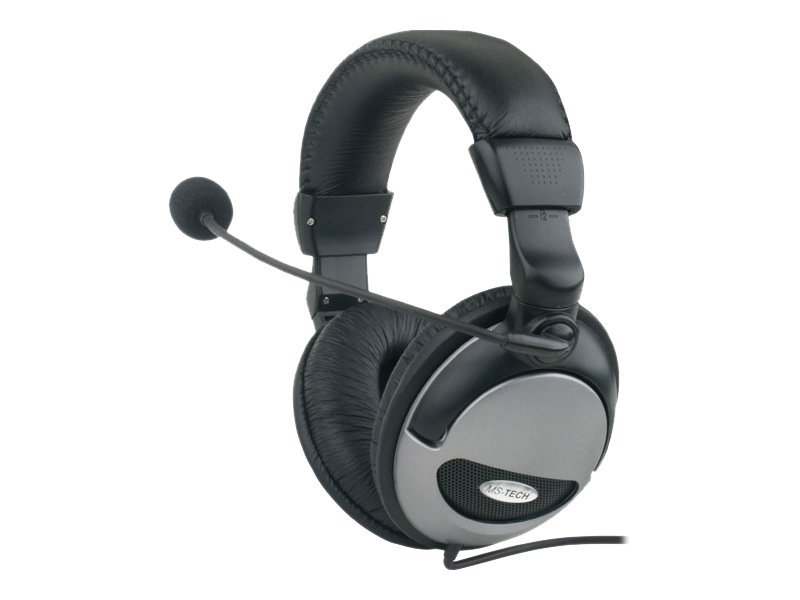
Complete technical specifications, details, expert ratings and review of MS-Tech LM-150. Find out how your chosen headphones stack up against the competition and whether they are the ones that best meet your expectations with the headphone comparison feature.
design and dimensions sound quality microphone remote control cable connections
| DESIGN AND DIMENSIONS MS-Tech LM-150 |
|---|
| Product Type | Headset - wired | |
|---|---|---|
| Recommended Use | Computer |
The MS-Tech LM-150 are wired headphones. In the case of studio and professional DJ headphones, a wired connection is a standard and a necessity. In this case, connecting via cable reduces audio transmission delays and prevents unwanted battery drain as it would be in case of wireless headphones. The same is de facto true for gaming headsets. In case of headphones for normal music listening, the cable is rather a relic, although it still has its fans. However, the wireless option is much more popular for everyday use in today’s world.
The design of the headphones is around the ears. Because of this design, the headphone envelops the entire ear and isolates the ear better from surrounding noise when listening compared to for example on-ear headphones. With that, they offer high-quality listening without interference. However, they are most likely heavier by design and less practical for frequent carrying.
| SOUND QUALITY MS-Tech LM-150 |
|---|
| Headphones Form Factor | Full size | |
|---|---|---|
| Headphones Technology | Dynamic | |
| Connectivity Technology | Wired | |
| Sound Output Mode | Stereo | |
| Sound Effects | Bass Boost | |
| Frequency Response | 20 - 20000 Hz | Better than 64 % of headphones rated. |
| Sensitivity | 101 dB | Worse than 65 % of headphones rated. |
| In-Cord Volume Control | Yes |
The sound quality can be affected by many factors. When it comes to frequency range, the wider it is, the more detail you will hear when listening. However, the range a person can perceive is highly individual. The average person is able to perceive frequencies in the range of 16 to 20 000 Hz. So the most common frequency range you will see on the market is 20 to 20,000 Hz. Lower frequencies up to approximately 256 Hz are considered bass frequencies. Therefore, the lower the bottom value is, the better the headphones will reproduce bass. Conversely, values from approximately 2 048 Hz upwards are treble. That is why headphones with a high upper value will provide a much more accurate reproduction of high notes. MS-Tech LM-150 offers a frequency range of 20 - 20000 Hz. The sensitivity parameter determines how sensitively the headphones can receive the signal from the source. The higher the sensitivity value, the louder the headphones will be able to play with less power consumption. In general, a higher listening volume also means a higher power load for the connected device. So if you're buying headphones to listen to music from your mobile phone, for example, this is relevant to think about as you don't want to drain your phone's battery too much. Lower values around 85 dB are more suitable for listening in more quiet environments (for example, at home or in the office). Medium values of around 90 dB can provide good listening quality in noisier environments (for example, on public transport or in cafés). Headphones with high sensitivity values of around 100 dB or more are designed for really noisy environments, such as concerts. The MS-Tech LM-150 has 101 dB. To control the optimum playback volume you can use the manual control directly on the cable.
Show more| MICROPHONE MS-Tech LM-150 |
|---|
| Type | Boom | |
|---|---|---|
| Connectivity Technology | Wired | |
| Frequency Response | 30 - 16000 Hz | Better than 89 % of headphones rated. |
MS-Tech LM-150 has a boom–type microphone.
Show more| REMOTE CONTROL MS-Tech LM-150 |
|---|
| Controls | Mute, volume |
|---|
| CABLE MS-Tech LM-150 |
|---|
| Cable Type | Headset cable - 2.2 m |
|---|
| CONNECTIONS MS-Tech LM-150 |
|---|
| Connector Type | Headset (mini-phone 3.5mm) |
|---|
Similar Headphones
Other MS-Tech Headphones